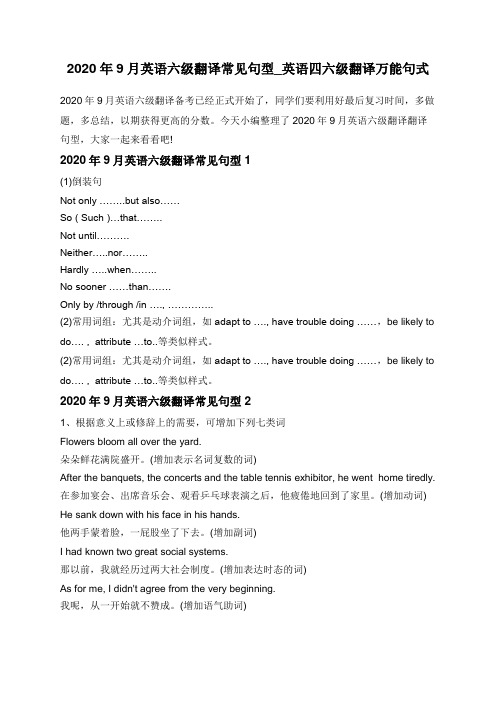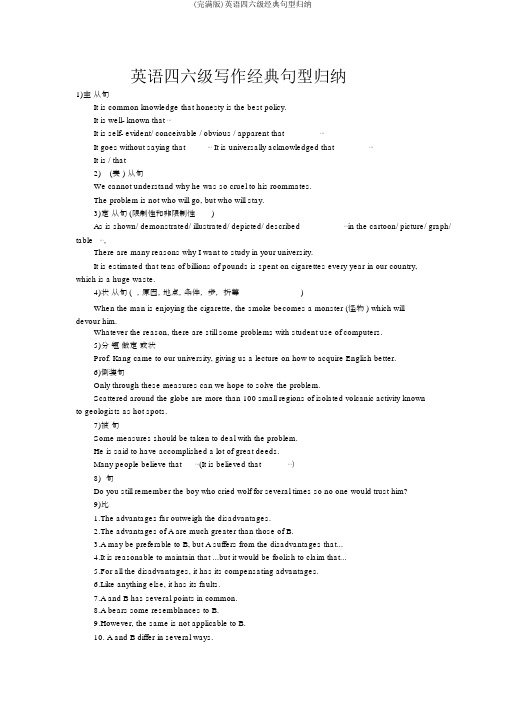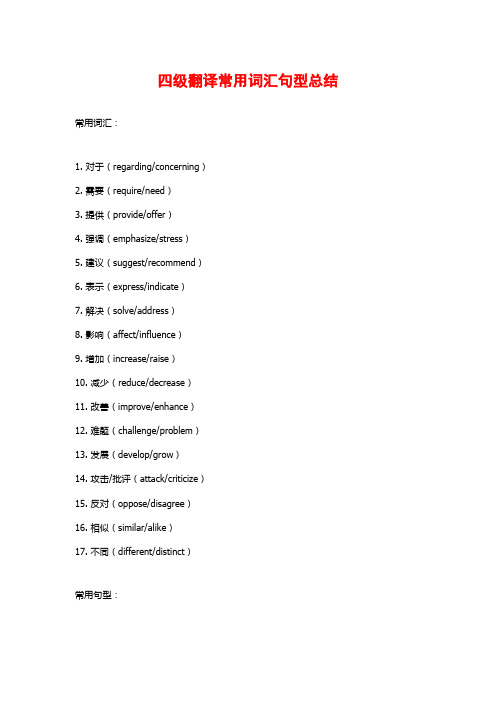四六级翻译十大常考句型
四六级考试中的必考短语和句式精选全文

可编辑修改精选全文完整版1. in advance 提前2.Give priority to 优先…3.Figure out 找出4.Broken down 抛锚5.Twist the meaning 扭曲意思6.Theater剧院/comedy喜剧/romantic story爱情故事/thriller惊悚片/tragedy悲剧/horror movie 恐怖电影7.The shows are not so entertaining. 表演不是那么的有趣。
8.Seasick 晕船/express way 高速公路/9.Sick 恶心10.Paying off 有了回报y off 解雇12.Headlines 头条,新闻报道(我爱KK)13.Economic forum 经济论坛14.For here or to go 在这儿吃还是打包带走;15.I have to watch my weight.小心体重16.They look pretty done.菜已经很熟了。
17.I can’t feel my arm. 我的手麻了。
18.My legs are fallen sleep 我的脚麻了19.Lucid thought 清醒的思维20.To pull strings连在一起,就是通过重要人物,在幕后操纵,在幕后牵线21.Go for registration of a course 注册课程(选课)22.The jacket of the book 书皮23.Sleeping compartment 卧铺24.Do the sight-seeing 观光25.Parking lot 停车场26.Get the prescription filled取药27.Take a year off 休假一年28.It is still a mystery to sb. 对某人而言,这依然是个迷。
29.get upset 变得烦躁30.not really!情况不是这样的31.I think you’d better… 建议句型;32.I am enrolled in… 我参加了…= I take part in…33.I am told that… 听说…(下雨天音乐和巧克力才更配哦.)= I hear that…(peo ple often take chocolate or flowers when they go to dinner at someone’s house.)34.I am afraid that… 恐怕(表示推测)=I think…35.I’d rather… 表达观点36.I made reservations for… 我预定了…37.I would die to have a chance to meet Kevin Kelly. 我愿意不惜一切代价去见KK.38.I got Kevin to do it. 我让kevin去做了。
2020年9月英语六级翻译常见句型_英语四六级翻译万能句式

2020年9月英语六级翻译常见句型_英语四六级翻译万能句式2020年9月英语六级翻译备考已经正式开始了,同学们要利用好最后复习时间,多做题,多总结,以期获得更高的分数。
今天小编整理了2020年9月英语六级翻译翻译句型,大家一起来看看吧!2020年9月英语六级翻译常见句型1(1)倒装句Not only ……..but also……So ( Such )…that……..Not until……….Neither…..nor……..Hardly …..when……..No sooner ……than…….Only by /through /in …., …………..(2)常用词组:尤其是动介词组,如adapt to …., have trouble doing ……,be likely to do…. , attribute …to..等类似样式。
(2)常用词组:尤其是动介词组,如adapt to …., have trouble doing ……,be likely to do…. , attribute …to..等类似样式。
2020年9月英语六级翻译常见句型21、根据意义上或修辞上的需要,可增加下列七类词Flowers bloom all over the yard.朵朵鲜花满院盛开。
(增加表示名词复数的词)After the banquets, the concerts and the table tennis exhibitor, he went home tiredly.在参加宴会、出席音乐会、观看乒乓球表演之后,他疲倦地回到了家里。
(增加动词) He sank down with his face in his hands.他两手蒙着脸,一屁股坐了下去。
(增加副词)I had known two great social systems.那以前,我就经历过两大社会制度。
(增加表达时态的词)As for me, I didn't agree from the very beginning.我呢,从一开始就不赞成。
(完整版)英语四六级经典句型归纳

英语四六级写作经典句型归纳1)主从句It is common knowledge that honesty is the best policy.It is well- known that ⋯It is self- evident/ conceivable / obvious / apparent that⋯It goes without saying that⋯It is universally acknowledged that It is / that2) (表 )从句We cannot understand why he was so cruel to his roommates.The problem is not who will go, but who will stay.3)定从句 (限制性和非限制性)As is shown/ demonstrated/ illustrated/ depicted/ described⋯⋯in the cartoon/ picture/ graph/table⋯,There are many reasons why I want to study in your university.It is estimated that tens of billions of pounds is spent on cigarettes every year in our country, which is a huge waste.4)状从句 (,原因,地点,条件,步,折等)When the man is enjoying the cigarette, the smoke becomes a monster (怪物 ) which will devour him.Whatever the reason, there are still some problems with student use of computers.5)分短做定或状Prof. Kang came to our university, giving us a lecture on how to acquire English better.6)倒装句Only through these measures can we hope to solve the problem.Scattered around the globe are more than 100 small regions of isolated volcanic activity known to geologists as hot spots.7)被句Some measures should be taken to deal with the problem.He is said to have accomplished a lot of great deeds.Many people believe that⋯(It is believed that⋯)8)句Do you still remember the boy who cried wolf for several times so no one would trust him?9)比1.The advantages far outweigh the disadvantages.2.The advantages of A are much greater than those of B.3.A may be preferable to B, but A suffers from the disadvantages that...4.It is reasonable to maintain that ...but it would be foolish to claim that...5.For all the disadvantages, it has its compensating advantages.6.Like anything else, it has its faults.7.A and B has several points in common.8.A bears some resemblances to B.9.However, the same is not applicable to B.10. A and B differ in several ways.11.Evidently, it has both negative and positive effects.12.People used to think ..., but things are different now.13.The same is true of B.14.Wondering as A is ,it has its drawbacks.15.It is true that A ... , but the chief faults (obvious defects )are ...10)原因1.A number of factors are accountable for this situation.A number of factors might contribute to (lead to )(account for ) the phenomenon(problem).2.The answer to this problem involves many factors.3.The phenomenon mainly stems from the fact that...4.The factors that contribute to this5.The change in rgely results from the fact that...6.We may blame ...,but the real causes are...7.Part of the explanations for it is that ...8.One of the most common factors (causes ) is that ...9.Another contributing factor (cause ) is ...10.Perhaps the primary factor is that⋯11.But the fundamental cause is that ...11)果1.It may give rise to a host of problems.2.The immediate result it produces is ...3.It will exercise a profound influence upon...4.Its consequence can be so great that...12)批1)It is true that ..., but one vital point is being left out.2)There is a grain of truth in these statements, but they ignore a more important fact.3)Some people say ..., but it does not hold water.4)Many of us have been under the illusion that...5)A close examination would reveal how ridiculous the statement is.6)It makes no sense to argue for ...7)Too much stress placed on ... may lead to ...8)Such a statement mainly rests on the assumption that ...9)Contrary to what is widely accepted, I maintain that ...13)例1)A good case in point is ...2)As an illustration, we may take ...3)Such examples might be given easily.4)...is often cited as an example.14)明1)No one can deny the fact that ...2)The idea is hardly supported by facts.3)Unfortunately, none of the available data shows ...4)Recent studies indicate that ...5)There is sufficient evidence to show that ...6)According to statistics proved by ..., it can be seen that ...15)开篇1)Many nations have been faced with the problem of ...2)Recently the problem has been brought into focus.3)Recently the phenomenon has become a heated topic.4)Recently the issue has aroused great concern among ...5)Nowadays there is a growing concern over ...6)Never in our history has the idea that ... been so popular.7)Faced with ..., quite a few people argue that ...8)According to a recent survey, ...9)With the rapid development of ..., ...16)结尾1)From what has been discussed above, we can draw the conclusion that ...2)It is high time that strict measures were taken to stop ...3)It is necessary that steps should be taken to ...4)In conclusion, it is imperative that ...5)There is no easy method, but ...might be of some help.6)To solve the above-mentioned problem, we must ...7)In summary, if we continue to ignore the above-mentioned issue, more problems will crop up.8)With the efforts of all parts concerned, the problem will be solved thoroughly.9)We might do more than identify the cause ; it is important to take actions to ...10)Taking all these into account, we ...11)Whether it is good or not /positive or negative, one thing is certain/clear...英语四六级写作25 个加分句型一、 the + est + 名词+ (that) +the most + 形容词+ 名词主词+ have ever + seen (known/heard/had/read, etc)+ (that) + 主词+ have ever + seen (known/heard/had/read,etc)例句: Helen is the most beautiful girl that I have ever seen 。
四级翻译常用词汇句型总结

四级翻译常用词汇句型总结常用词汇:1. 对于(regarding/concerning)2. 需要(require/need)3. 提供(provide/offer)4. 强调(emphasize/stress)5. 建议(suggest/recommend)6. 表示(express/indicate)7. 解决(solve/address)8. 影响(affect/influence)9. 增加(increase/raise)10. 减少(reduce/decrease)11. 改善(improve/enhance)12. 难题(challenge/problem)13. 发展(develop/grow)14. 攻击/批评(attack/criticize)15. 反对(oppose/disagree)16. 相似(similar/alike)17. 不同(different/distinct)常用句型:1. As we all know, (众所周知的,……)2. It is well known that (众所周知的,……)3. There is no doubt that (毫无疑问的,……)4. It is believed that (人们认为,……)5. It is widely acknowledged that (广泛认为,……)6. It is clear that (显然,……)7. It is obvious that (很明显,……)8. It is worth noting that (值得注意的是,......)9. It is essential that (非常重要,……)10. The key to solving this problem is (解决这个问题的关键是,……)11. It is necessary for us to (对我们来说是必要的,……)12. It is crucial that we (非常关键的是,……)13. In my opinion, (我认为,……)14. From my point of view, (从我的观点来看,……)15. It is my belief that (我相信,……)16. Personally speaking, (就个人而言,……)17. In conclusion, (总结地说,……)18. To sum up, (总结起来,……)19. In a word, (一句话,……)20. In summary, (概括一下,……)。
大学英语四级翻译常考句型

大学英语四级翻译常考句型1. …as soon as… 一……就……1 Peter一听到消息就兴奋地喊起来; As soon as Peter heard it, he cried out excitedly.2. as…as 和……一样& not as/ so…as ……不如……1听磁带和看英语电影一样重要;Listening to tapes is as important as watching English-language movies.3. as … as possible 尽可能地……1 当你感冒的时候,你应该喝尽可能多的水;When you have a cold, you should drink as much water as possible.4. ask sb for sth…… 向某人要……1 当你不知道问题的答案时,你可以向你的老师寻求帮助;When you don‘t know the answer to any questions, you can ask your teacher for help.5、ask/tell sb. how to do sth.请/告诉某人如何做……1 Tom的爸爸经常告诉Tom应该如何正确面对问题;Tom‘s father often tells Tom how to deal with the problems in the correct way.6. ask/tell sb. not to do sth. 请/告诉某人不做某事1 我妈妈经常告诉我不要花费太多时间玩电脑游戏;My mother often tells me not to spend so much time in playing computer games.7. be afraid of doing sth. / that+从句担心某事可能产生的后果1 学生们为考试担心不足为奇;It‘s no surprise that students are afraid of having exams.8. be afraid to do sth. 害怕去/不敢去做某事1 Peter害怕在别人面前说话; Peter is afraid to speak in front of other people.9. be busy doing sth./be busy with sth. 忙于做某事/忙于某事1他正忙着通过听磁带来学习英语; He is busy studying English by listening to tapes.11…为……准备/……迟到了/对……感到歉意1 我们已经准备好聚会了; We have got ready for the party.12 高兴……1你应该高兴,你能去欧洲;You should be glad you will travel to America..13、最……之一1 他是他们班最高的孩子之一; He is one of the tallest children in his class.2 纸是最有用的发明之一; Paper is one of the most useful inventions.3 故宫是北京最有名的风景名胜之一;The Palace Museum is one of the most famous places of interest in Beijing.推荐信息4北京是中国最大的城市之一; Beijing is one of the largest cities in China.5他是跑的最快的学生之一; He is one of the students who runs fastest.14带来/送给/寄给/借给/传递/告诉某人某事物1 请递给我那支笔; Please pass me that pen.3 到达美国后请立刻给我寄一封信; Please send me a letter as soon as you get toAmerica.4他给我带来一支玫瑰; He brought me a rose.5我借给他10元钱; I lent him 10yuan.15…或者……或者;不是……就是1 要么进来,要么出去; Either come in or go out.2 我想要去巴黎或伦敦; I want to visit either Paris or London.3 你喝茶也行,喝咖啡也行; You can have either tea or coffee.4 手机不仅能打电话,还能上网;The Mobile phone is used to either make a phone call or surf the Internet.5 不是他就是你喜欢蓝色;Either you or he likes blue.16喜爱/喜欢、讨厌做某事1 我喜欢集邮;I enjoy collecting stamps.2 我讨厌排队很长时间; I hate waiting for a long time.3 她喜欢在业余时间读书; She likes reading in her spare time.4他喜欢独处;He enjoys staying alone.5妈妈不喜欢坐飞机; Mum hates taking a plane.17 完成/介意/保持/继续做某事1 你写完作业了吗Have you finished doing your homework2 关上门你介意吗 Would you mind closing the door3 每日保持锻炼对你身体有好处;Keeping doing exercise is good for your health.4抱歉,让你久等了; I‘m sorry to keep you waiting so long.推荐信息18为……做好准备1 请为即将到来的考试做好准备;Please get ready the coming examination.2 伦敦已经做好了2012奥运会的准备; London has got ready for the 2012 OlympicGames.19最好不要做某事1 你最好别对老人大声嚷嚷; You‘d better not shout at the old man.20在某方面帮助某人1 她经常帮助妈妈做家务;She often helps her mum do the housework.2 请在英语方面帮助我; Please help me with my English.3 你能帮我擦黑板吗 Could you please help me clean the blackboard4 我认为帮别人做作业不是好事; I don‘t think it’s a good idea to help others do homework.5 他帮家长找到了那个迷路的孩子;He helped the parents find the lost boy.21. I don‘t think that+从句我想…不会…;我认为…不…1 我认为这不是学习英语最好的方法;I don‘t think that it’s the best way to learn English.2我认为没有电脑的生活是不完美的;I don‘t think that life is perfect推荐信息without computers.3 我认为你不应该撒谎; I don‘t think you should tell a lie.4 我认为在上课说话是不对的; I don‘t think it’s right to talk in class.5 我认为这件衣服并不漂亮; I don‘t think this clothes is very beautiful.22. I would like to do sth. 我想做…1我想让你帮帮我; I would like to let you give me a hand.23. It looks+形容词/ It sounds+形容词看上去…;听起来…1 看起来不错;It looks nice.2 听起来不错 It sounds good3 听起来很糟糕; It looks terrible.4 听起来像个不错的主意; It sounds like a good idea.5 你看起来像一个好人; You look like a good person.24. It‘s bad/ good for sb. to do sth. 做某事对某人有害/有益1 每天抽烟对你有害;It is bad for you to smoke every day.2 每天锻炼对你的健康有好处; It is good for your health to exercise every day.3 每天坚持说英语对你的英语学习有好处;It is good for your English study to keep speaking English every day.4 早睡早起有利健康;It‘s good for your health to go to bed early and get up early.5 不按时写英语作业对我们不好;It is bad for us to do English homework on time.25. It‘s a good idea to do sth. 去做某事是一个好主意;1 每天做大量的阅读是个好主意;It‘s a good idea to do lots of exercise.26. It‘s important for sb. to do sth.1 对他来说,学好英语很重要;It‘s important for him to learn English well.2 对每个人来说,保持健康很重要;It‘s important for everyone to keep healthy.3 每天吃大量的蔬菜是很重要的;It‘s very important to eat plenty o f vegetable.4 每天做大量的听力练习很重要的;It‘s very important to do lots of listening practice every day.5 能分辨是非是很重要的;It is very important to tell the difference between right and wrong.27. It‘s time for sth. ……的时间来了;该干……的时候了28. It‘s time for sb. to do sth. 是某人做……的时候了1是我们弹钢琴的时间了; It‘s time to play the piano.29. It‘s three metres long/high/wide. 它是三米长/高/宽30. It takes sb. some time to do sth. 做某事花费某人多长时间;1那道数学题真难,我花了1个小时的时间才做出来;The math exercise was so difficult that it took me an hour to work it out.32. keep sth.+形容词让…一直保持…/ make sth.+形容词使……怎么样1这可以让老师和学生都很高兴推荐信息This can make both the teacher and the students happy.33. look forward to doing sth.盼望做某事;1 我期待收到你的来信;I‘m looking forward to hearing from you.I‘m looking forward to your letter.34. make/let sb. not do sth. 使、让某人不做某事;1 谁把你弄哭啦Who makes you cry2 让我们去游泳吧;Let‘s go swimmin g.3 让我们去公园吧;Let‘s go to the park.4 妈妈让我尽快把屋子整理干净My mother made me clean the room as soon as possible.5 为了学好英语,老师总是让我们早晨大声朗读;In order to study English well, the teacher always makes us read aloud in the morning 35. neither…nor…既不……,也不……1老师和学生都不在教室;Neither the teacher nor the students are in the classroom.36. not… at all 根本不;一点也不1 我一点都不喜欢足球;I don‘t like football at all.2 这本书一点意思都没有;The book is not interesting at all.3 我一点也不想把笔记借给她;I don‘t want to lend the notebook to him at all.4 他根本不该再犯同样的错误;He shouldn‘t make the same mistake at all.5 他根本不知道怎么与别人相处;He doesn‘t know how to get on with others at all.37. not only…but also… 不但……而且……1不仅他想知道如何学好英语,我也想知道;Not only he but also I want to know how to study English well.38. not…until 直到……才1直到Miss Smith进来了,学生们才停止了说话;The students didn‘t stop talking until Miss Smith came .…,the other… 一个……,另一个……1Tom的父母都在中国,一个当老师,一个当医生;Tom‘s parents are in China. One is a teacher, the other is a doctor.40. some…, others… 一些……,另一些……1他给我们带来好多书;有的是告诉我们如何学习的,有的告诉我们保持健康的;He brought us lots of good books. Some tell us how to study, others tell us how to keep healthy.A toB 喜欢A胜过B1成千上万的孩子如今一边听流行音乐一边做作业,也不愿在安静的房间里做;Thousands of children nowadays prefer doing their homework to a background of pop-music to doing it in a quiet room./ hear sb. do sth. 看见/听见某人做某事1我们经常看到孩子们在警察的帮助下过马路;We often see the children cross the street with the help of the police.hear sb. doing sth. 看见听见某人在做某事1有人看见她从犯罪现场跑开;She was seen running away from the scene of the crime.2我们看见他们那时在打扫教室; We saw them cleaning the classroom at that time.…that… 如此…形容/副词…以致于……1学校太远了,男孩不能自己去; The school is so far that the boy can‘t get there by himself.45. such…that… 如此…名词…以致于……1学校太远了,男孩不能自己去; It‘s such a far school that the boy can’t get there by himself.46. spend …on sth./ in doing sth. 花费时间在…/花时间做……1别在那些没意义的事情上花如此多的时间;Don‘t spend so much time on thos e meaningless things.50. take sth. with sb. 随身带去某物; bring sth. with sb. 随身带来某物1你有必要每天随身携带一些钱;It‘s necessary for you to bring some money with you every day.2要下雨了;你最好随身带一把伞;It‘s going to rain. You had better take an umbrella with you.more…,the more… 越……;, 越……1你学的越多,你的成绩就越好;The more you learn, the better your score will be.2 你锻炼越多越健康; The more you exercise, the healthier you are.3 越多越好 The more, the better.52. There is something wrong with. ……;有了毛病1我的电脑一点毛病也没有; There is nothing wrong with my computer.…;to 太……而不能1这个老人太老了,不能自己照顾自己;The old man is too old to look after himself.to do 过去常常1 我弟过去个子不高,但是现在很高;My brother used to be short, but now he is tall.55. What about… How about………怎么样Why not do =Why don‘t you do 为什么不做……呢1 为什么不买个相机呢Why not buy a camera Why don‘t you buy a camera2 为什么不走59. Could you please do请你做……好吗 WillWould you please do着去呢Why not go on foot=Why don‘t you go on foot60. Would you like to do sth. 你想要做……吗1 我想喝杯咖啡; I would like to have a glass of coffee.。
四六级写作常用句型和翻译高频词汇

• 比起女人,男人总是宁可在家睡觉也不愿花那么多时间来购物
• Compared with women, men always prefer to sleep at home rather than spend so much time shopping。
• act on 奉行,按照…行动; act as 扮演; act for 代理 in addition (=besides) 此 外, 又, 加之 adjacent(=next to, close to) 毗邻的, 临近的
• adapt oneself to(=adjust oneself to) 使自己适应于 . adjust..(to) (=change slightly)调节; 适应 in advance (before in time) 预告, 事先
他们太累了,除了伸懒腰什么都做不了
They were all so tired that they could do nothing but yawn 4. such…that
天气非常冷,以致于街上一个人都没有
It was such a cold day that there was nobody on the street。 5. would rather do…than do
你看见桌子上有两只笔吗?一支是红色的,另一支是黑色的
Have you seen two pens on the desk? One is red, the other is black 10. not…until
直到他告诉我发生的事,我才了解真相
I didn’t know the truth until she told me what happened。
2021年12月大学英语四六级翻译黄金必做13句
2021年12月大学英语四六级翻译黄金必做13句2021年12月大学英语四六级翻译黄金必做13句,更多关于英语四六级考试技巧等信息,请访问本店铺。
1. 人们常用剪纸美化居家环境。
方法1:第一步:人们【常】(用)剪纸【美化居家环境】。
第二步:Peopleoften use paper cutting to beautify their living environment.方法2:第一步:人们【常用剪纸】(美化)居家环境。
第二步:Peopleoften beautify their houses with paper cutting.说明:第一道题,我们就用了两种种方式来解读一句话,也告诉大家翻译非常灵活,希望大家学会一些变通手段。
2.中国应该进一步发展核能,因为核电目前只占其总发电数的2%。
第一步:中国(应该)【进一步】(发展)核能,因为核电【目前】【只】(占)【其总发电数的】2%。
第二步:主干:China should develop its nuclear energy, because itsnuclear power accounts for 2% of________.总发电数:total generating capacity完整:China should further develop its nuclear energy, because its nuclear power currently accounts for only 2% of its total generating capacity.说明:这道题告诉大家,积累词汇非常重要!如果真的不知道总发电数,只能写成total electricity,尽管不准确,但是评卷是不会因此扣去很多分数,评卷的分数只要依赖于译文的整体印象。
3.为了促进教育公平,中国已经投入360亿元,用于改善农村地区教育设施和加强中西部地区农村义务教育。
英语四级作文翻译必背50句
四六级写作、翻译必背句型学习步骤和方法:一看二译三比四背(一)理解并重点掌握其中的常用表达(划线部分)(二)做汉译英练习,即在不看英文的前提下把中文翻译成英语;(三)将自己的译句与原句比较;(四)默写并口头背诵英语原句特别提示:最好要拟订进度计划,即详尽每天理解和背诵多少个新句,复习多少个旧句。
1. According to a recent survey, each year four million people die from diseases linked to smoking.依照近来的一项检查,每年有4,000, 000 人死于与吸烟有关的疾病。
2. The latest surveys show that quite a lot of students have unpleasant associations with homework.近来的检查显示相当多的学生对家庭作业没什么好感。
3.No invention has received more praise and abuse than Internet.没有一项发明像互联网相同同时碰到这样多的赞美和责怪。
4.People seem to fail to take into account the fact that education does not end with graduation.人们忧如忽视了教育不应该随着毕业而结束这一事实。
5. An increasing number of people are beginning to realize that education is not complete with graduation.越来越多的人开始意识到教育不能够随着毕业而结束。
6.When it comes to education, the majority of people believe that education is a lifelong course.说到教育,大多数人认为其是一个平生的过程。
大学英语四六级翻译万能模板
大学英语四六级翻译万能模板民族类:XX民族是中国少数民族之有…人口,分布于…。
XX民族有自己的语言…,习俗为(穿着与文化等)…。
最著名的节日是…。
XX民族有自己独特的文化…。
XX民族擅长…。
XX is one of the ethnic minorities in China.__________population,distributedin__________.XX nation has its own language_________.Custom for(dress and culture,etc.)_________.The most famous festival is__________.XX nation has its own unique culture__________.XX nationality is good at__________.1、蒙古族蒙古族是一个富有传奇色彩的民族,对亚欧历史进程产生过巨大的影响。
全球蒙古民族共约有820万,主要分布在中国、蒙古国、俄罗斯三个国家。
蒙古族服饰包括长袍、腰带、靴子、首饰等,但因地区不同在样式上有所差异。
中国境内的蒙古族主要居住在内蒙古自治区,全区现有蒙古族人口约达380万。
自古以来,蒙古族人善于骑射,素有"马背上的民族"(the People on Horseback)之称。
参考译文:Mongolia is a legendary nation that once had huge impact on the history of Asia and Europe.There are about8.2million Mongolian people in total in the whole world. They are mainly distributed in the three countries of China,Mongolia and Russia.Mongolian costumes include robes,belts,boots,jewelry,etc,that vary in different styles in different regions.Mongolians who live in the territory of China mainly reside in Inner Mongolia Autonomous Region,in which there are about3.8 million Mongolian people.Since ancient times,Mongolian people are good at riding and shooting.They are known as"the People on Horseback".2、维吾尔族维吾尔族(Uygur)是中国的一个少数民族。
四六级英语翻译资料大全
成语1.爱屋及乌Love me, love my dog.2.百闻不如一见(眼见为实)Seeing is believing.3.比上不足比下有余Worse off than some,better off than many; to fall short of the best, but be better than the worst.4.笨鸟先飞A slow sparrow should make an early start.5.不眠之夜white night6.不以物喜不以己悲not pleased by external gains, not saddened by personnal losses7.不遗余力spare no effort; go all out; do one's best8.不打不成交No discord, no concord.9.拆东墙补西墙rob Peter to pay Paul10.辞旧迎新bid farewell to the old and usher in the new; ring out the old year and ring in the new.11.大事化小小事化了try first to make their mistake sound less serious and then to reduce it to nothing at all12.大开眼界open one's eyes; broaden one's horizon; be an eye-opener13.国泰民安The country flourishes and people live in peace14.过犹不及going too far is as bad as not going far enough; beyond is as wrong as falling short; too much is as bad as too little15.功夫不负有心人Everything comes to him who waits.16.好了伤疤忘了疼once on shore, one prays no more17.好事不出门恶事传千里Good news never goes beyond the gate, while bad news spread far and wide.18.和气生财Harmony brings wealth.19.活到老学到老One is never too old to learn.20.既往不咎let bygones be bygones21.金无足赤人无完人Gold can't be pure and man can't be perfect.22.金玉满堂Treasures fill the home.23.脚踏实地be down-to-earth24.脚踩两只船sit on the fence25.君子之交淡如水the friendship between gentlemen is as pure as crystal; a hedge between keeps friendship green26.老生常谈陈词滥调cut and dried, cliché27.礼尚往来Courtesy calls for reciprocity.28.留得青山在不怕没柴烧Where there is life, there is hope.29.马到成功achieve immediate victory; win instant success30.名利双收gain in both fame and wealth31.茅塞顿开be suddenly enlightened32.没有规矩不成方圆Nothing can be accomplished without norms or standards. 33.每逢佳节倍思亲On festive occasions more than ever one thinks of one's dear ones far away.It is on the festival occasions when one misses his dear most.34.谋事在人成事在天The planning lies with man, the outcome with Heaven. Man proposes, God disposes.35.弄巧成拙be too smart by half; Cunning outwits itself36.拿手好戏masterpiece37.赔了夫人又折兵throw good money after bad38.抛砖引玉a modest spur to induce others to come forward with valuable contributions; throw a sprat to catch a whale39.破釜沉舟cut off all means of retreat;burn one‘s own way of retreat and be determined to fight to the end40.抢得先机take the preemptive opportunities41.巧妇难为无米之炊If you have no hand you can't make a fist. One can't make bricks without straw.42.千里之行始于足下a thousand-li journey begins with the first step--the highest eminence is to be gained step by step43.前事不忘后事之师Past experience, if not forgotten, is a guide for the future. 44.前人栽树后人乘凉One generation plants the trees in whose shade another generation rests.One sows and another reaps.45.前怕狼后怕虎fear the wolf in front and the tiger behind hesitate in doing something46.强龙难压地头蛇Even a dragon (from the outside) finds it hard to control a snake in its old haunt - Powerful outsiders can hardly afford to neglect local bullies.47.强强联手win-win co-operation48.瑞雪兆丰年A timely snow promises a good harvest.49.人之初性本善Man's nature at birth is good.50.人逢喜事精神爽Joy puts heart into a man.51.人海战术huge-crowd strategy52.世上无难事只要肯攀登Where there is a will, there is a way.53.世外桃源a fictitious land of peace away from the turmoil of the world;54.死而后已until my heart stops beating55.岁岁平安Peace all year round.56.上有天堂下有苏杭Just as there is paradise in heaven, ther are Suzhou and Hangzhou on earth57.塞翁失马焉知非福Misfortune may be an actual blessing.58.三十而立A man should be independent at the age of thirty.At thirty, a man should be able to think for himself.59.升级换代updating and upgrading (of products)60.四十不惑Life begins at forty.61.谁言寸草心报得三春晖Such kindness of warm sun, can't be repaid by grass.62.水涨船高When the river rises, the boat floats high.63.时不我待Time and tide wait for no man.64.杀鸡用牛刀break a butterfly on the wheel65.实事求是seek truth from facts; be practical and realistic; be true to facts66.说曹操,曹操到Talk of the devil and he comes.67.实话实说speak the plain truth; call a spade a spade; tell it as it is68.实践是检验真理的唯一标准Practice is the sole criterion for testing truth.69.山不在高,有仙则名No matter how high the mountain is, its name will spread far and wide if there is a fairy.70.韬光养晦hide one's capacities and bide one's time71.糖衣炮弹sugar-coated bullets72.天有不测风云Anything unexpected may happen, a bolt from the blue73.团结就是力量Unity is strength.74.“跳进黄河洗不清”'eve if one jumped into the Yellow River, one can not wash oneself clean--there's nothing one can do to clear one's name '75.歪风邪气unhealthy practices and evil phenomena76.物以类聚,人以群分Birds of a feather flock together.77.往事如风'The past has vanished (from memory) like wind.; What in past, is pas78.望子成龙hold high hopes for one's child79.屋漏又逢连阴雨Misfortunes never come singly. When it rains it pours.80.文韬武略military expertise; military strategy81.唯利是图draw water to one's mill82.无源之水,无本之木water without a source, and a tree wiithout roots83.无中生有make create something out of nothing84.无风不起浪There are no waves without wind. There's no smoke without fire.85.徇私枉法bend the law for the benefit of relatives or friends86.新官上任三把火a new broom sweeps clean87.虚心使人进步,骄傲使人落后Modesty helps one go forward, whereas conceit makes one lag behind.88. 蓄势而发accumulate strength for a take-off89.心想事成May all your wish come true90.心照不宣have a tacit understanding; give tacit consent; tacit understanding91.先入为主First impressions are firmly entrenched.92.先下手为强catch the ball before the bound93.像热锅上的蚂蚁like an ant on a hot pan94.现身说法warn people by taking oneself as an example95.息事宁人pour oil on troubled waters96.喜忧参半mingled hope and fear97.循序渐进step by step98.一路平安,一路顺风wish you a safe / good trip / journey99.严以律己,宽以待人be strict with oneself and lenient towards others101.有情人终成眷属'Jack shall have Jill, all shall be well.'102.有钱能使鬼推磨Money makes the mare go. Money talks.103. 有识之士people of vision104.有勇无谋use brawn rather than brain105.有缘千里来相会Separated as we are thousands of miles apart, we come together as if by predestination.106.与时俱进advance with times107.以人为本people oriented; people foremost108.因材施教teach students according to their aptitude109.欲穷千里目,更上一层楼'to ascend another storey to see a thousand miles further; Ascend further, were you to look farther; Would eye embrace a thousand miles? Go up, one flight.' a land of milk and honey110.欲速则不达Haste does not bring success.111. 优胜劣汰survival of the fittest112.英雄所见略同Great minds think alike.113.冤家宜解不宜结Better make friends than make enemies.114.冤假错案'cases in which people were unjustly, falsely or wrongly charged or sentenced; unjust, false or wrong cases'115.一言既出,驷马难追A real man never goes back on his words.116.招财进宝Money and treasures will be plentiful117.债台高筑become debt-ridden119. 众矢之的target of public criticism120.知己知彼,百战不殆Know the enemy and know yourself, and you can fight a hundred battles with no danger of defeat.121. 纸上谈兵be an armchair strategist122.纸包不住火Truth will come to light sooner or later.123.左右为难between the devil and the deep blue sea做汉译英时,往往受到英语单词和汉语单词“对号入座”的影响,用来用去这几个词。
- 1、下载文档前请自行甄别文档内容的完整性,平台不提供额外的编辑、内容补充、找答案等附加服务。
- 2、"仅部分预览"的文档,不可在线预览部分如存在完整性等问题,可反馈申请退款(可完整预览的文档不适用该条件!)。
- 3、如文档侵犯您的权益,请联系客服反馈,我们会尽快为您处理(人工客服工作时间:9:00-18:30)。
四六级翻译十大常考句型
冲刺阶段,考生除了要积累大量的翻译常考词汇,还要能灵活运用翻译中的常考句型,从而能够把词汇和句型结合起来,这样才会在翻译句子、段落时如鱼得水,无往不胜。
下面将对最常考的十大翻译句型进行详细介绍和解析。
常考句型1:形式主语it句(it is...(for sb) to do/that...)
在这种句型中,it作为形式上的主语,并无实际语义,只是为了满足语法上的需求,避免句子头重脚轻。
因此,在汉译英的过程中,如果汉语句子的主语非常长,而谓语部分又相对较短,那么在把它翻译为英语句子时,可以把汉语中的主语以动词不定式的形式或者that从句的形式放在最后,把it作为形式主语。
例:我们城市的多数人将享受免费医疗,这是一定的。
【参考译文】It is certain that free medical care will be given to most people in our city.
常考句型2: 存在句(there be句型)
存在句在英语中用来表示人或事物的存在、出现等意义,大多存在于描述性文章中。
因此在汉译英时,如果一句话是表示一种客观存在的描述时,可以采取翻译为存在句的办法。
此处的be可以根据汉语意思变化为各种形式如appear to be, seem to be, happen to be, used to be, ought to be, must be。
存在句除了典型的there be结构,还可以用其他的系动词如live,stand,lie,come,exist,remain等来替换系动词be。
例:那里曾经有来自其他国家的移民。
【参考译文】There used to be immigrants from other countries.
常考句型3:主谓宾结构句汉语和英语语言体系中都有主谓宾结构(如,中国有着悠久的历史:China has a long history),而且都是语言的基本结构,因此掌握主谓宾句的用法在汉译英时是非常有帮助的。
如果看到的汉语句子是非常规整的主谓宾结构,那么在翻译时就可以直接用对应的英语句子来翻译。
例:中国将加速节能产业的发展,使其到2015年成为国民经济的支柱产业。
【参考译文】China will speed up the development of energy-saving industry and make it a pillar of the national economy by 2015.
常考句型4:比较句比较句是英语中很常用的句式,应用范围极其广泛。
该句式主要是通过形容词和副词的原级、比较级和最高级三种形式来对两种或两种以上的事物进行比较。
因此如果汉语句中出现“(不)和/像......
一样”,那么可以用同级比较句“主语+谓语+(not)so/as +形容词/副词原级+as+被比较的对象”;同样,如果句中出现“比......”这个标志性词,那么可以用“主语+谓语+more/less+形容词/副词原级+than+被比较的对象”来表示。
而出现“最.......”则需要用最高级比较句“the most/least+形容词/副词+(名词)”。
例:北京大学是中国成立最早、最著名的大学之一。
【参考译文】Peking University is one of the most earliest and most famous universities in China.
其他常考句型
常考句型5:让步状语从句(Although... ; though...)
常考句型6:原因状语从句(...because....)
常考句型7:目的/结果状语从句(so (such)...that...;so that...)
常考句型8:条件状语从句(If...)
常考句型9:递进句(What’s more...;Moreover,...)
常考句型10:结果句(Therefore, ....;..., consequently, ...)
汉语中经常会有一些诸如“因为,尽管,因此,而且,如果”等这样的词来引导一句话,这种情况下,我们可以用英语中对应的状语从句或者逻辑词来对应地表达汉语中的意思。
例:中国梦是中国的一个新名词。
人们已经开始期待一个“梦想的国度”。
因此,在中国人的意识中,中国梦将会取代美国梦。
【参考译文】The Chinese Dream is a new term in China. People have begun to expect a “dream country”. Therefore, in the mind of Chinese people, the Chinese Dream will supersede the American Dream.。
